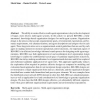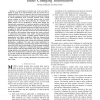11030 search results - page 2172 / 2206 » Generative Sound Models |
137
click to vote
ECSA
2010
Springer
15 years 2 months ago
2010
Springer
In the software domain, self-adaptive systems are able to modify their behavior at run-time to respond to changes in the environment they run, to changes of the users' require...
158
Voted
GECCO
2010
Springer
15 years 2 months ago
2010
Springer
This paper takes an economic approach to derive an evolutionary learning model based entirely on the endogenous employment of genetic operators in the service of self-interested a...
110
click to vote
AAMAS
2008
Springer
15 years 2 months ago
2008
Springer
The ability to create effective multi-agent organizations is key to the development of larger, more diverse multi-agent systems. In this article we present KB-ORG: a fully automate...
151
click to vote
AI
2008
Springer
15 years 2 months ago
2008
Springer
The execution performance of an information gathering plan can suffer significantly due to remote I/O latencies. A streaming dataflow model of execution addresses the problem to s...
152
Voted
AROBOTS
2007
15 years 2 months ago
2007
— A central goal of robotics and AI is to be able to deploy an agent to act autonomously in the real world over an extended period of time. To operate in the real world, autonomo...


